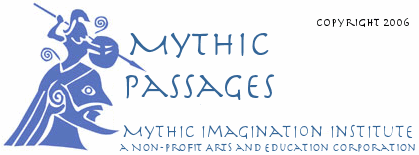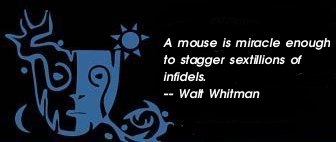|

Book Review
Islam: A Short History, revised.
Karen Armstrong
Modern Library Chronicles Book, 2002
231 pp. paperback. $12.00
Reviewed by Dennis Patrick Slattery, Ph. D.

Dennis Patrick Slattery, Ph.D. is Core Faculty, Mythological Studies, Pacifica Graduate Institute.
The author of over 225 articles on culture, psychology and literature, as well as author of 7 books,
his most recent is entitled Grace in the Desert: Awakening to the Gifts of Monastic Life
(Jossey-Bass, 2004), which describes a spiritual pilgrimage staying in 12 monasteries and Zen Buddhist
centers in the United States over a three and a half month sojourn. He was also a presenter at
Mythic Journeys 2004, and he presented a lecture and workshop on February 17 and 18,
2006, for the C.G. Jung Society of Atlanta, a partner of the Mythic Imagination Institute.

Karen Armstrong's complex, thorough and measured review of the history of Islam is without a doubt the best twelve dollars I have
ever spent on a book. A former nun for seven years, Armstrong is considered one of the finest scholars on religion in the world. Her books,
in addition to the one under review here, as well as The History of God, The Battle for God, and Jerusalem have
been best sellers. For those interested in our current imbroglio in Iraq and the history of Islam as a non-violent and compassionate religion
that has been distorted into a violent belief system, her book is indispensable.
And do not let the word "short" in the title mislead. Her scholarship is so tightly packed that as she leads the reader through the history
of the Middle East from the epiphany in 610 of the prophet Muhammad ibn Abdallah, a former Arab businessman, to the destruction of the
World Trade Center in 2001, one can grow dizzy from the stream of information outlining this tumultuous history. The Quran, the holy
Islamic text, was revealed to Muhammad over a period of 21 years and set the foundation for Islamic beliefs. As a historian of religion and an
insightful observer of the development of Islam, Armstrong reveals a steady, assertive voice in compressing the complexity of Islam's rise as
well as the origins of a fundamentalist backlash when many of the advocates of Islam have felt and continue to feel threatened by Western
secular invasion.

As one who has read in the Quran, but who did not appreciate the historical flow of Islam throughout the Middle East, I find that her
book has widened and deepened my own understanding of its religion, its similarity with Christian beliefs to reveal how Christians and Muslims
are more alike than different in our lived values.
Filled with delicious appendages, including maps, lists of leading Islamic figures in history, a Glossary of Arabic Terms, a pronunciation key,
a massive bibliography of further readings, Armstrong's book divides into five chapters: "Beginnings," "Development," "Culmination," "Islam
Triumphant," and "Islam Agonistes," followed by an Epilogue on 9/11/2001. Each chapter is then divided into historical periods to make the
complexity of Islam's rise as a major religion more accessible. While too intricate to outline in a short review here, the book does highlight a
number of important distinctions and similarities between Islam and Christianity that are worth mention.
The term Islam, which means "surrender," is followed by Muslims, those, she writes, who have made the submission of their entire being
to Allah and his demand that human beings behave to one another with justice, equity, and compassion. Social justice is at the heart of
Islamic society so that political activism is not just encouraged or tolerated, it is essential to Islamic practice. Far from separation of Church
and State in the U.S. plan of governance, Church and State for Islam's followers are of a piece because it is "The achievement of a society
that puts into practice God's desires for the human race." And, contrary to the West's invention of the future that seems to usurp most
of our energy, for Islam "History becomes a religious activity." This inflection towards the historical is also captured in the simple prayer of
faith uttered by Muslims: "There is no god but Allah and Muhammad is his prophet," which keeps the historical wedded with the eternal.
Armstrong is insistent in observing that to force any other kind of political order on Muslim societies, including democracy when they
are not ready for it, already courts disaster. This action can and often has historically, led to a rapid rise of fundamentalism as a recoil from
other countries' oppression, however well-meaning their intentions. I found this part of her study most provocative. A deep-seated fear in
Islamic countries is that Western obeisance towards secularism threatens to wipe out their religion. Fundamentalism then exaggerates what
in the doctrine of the people is against modern qualities of a secular ethos. It reveals, as Armstrong states, "a fissure in society between two
forces: those who enjoy secular society and those who dread it." Over time both forces lose the ability to speak to one another. When
Islamic countries feel that their backs are against the wall, they seem to produce extremists who will often resort to violence and terrorism
to hold back the tide of what they perceive as threats to their religious way of life. Then religion is torqued and twisted to justify violent ends.
Stereotyping arises and vision narrows.
However, as Armstrong affirms, many people in Muslim countries want to exercise Muhammad's "middle way," between secular and
sacred society, to take the best of Western values and graft it to their religious faith. She believes that only when the West accepts the
reality that there is more than one way to be "modern" will the extremes move towards an agreed mean.
I wish this book were adopted in history classes across the country; it revealed to me how little I actually understood about current
strife between the United States and the Middle East. I read the newspaper differently these days.
Return to Passages Menu
Subscribe to the Passages e-newsletter
|

